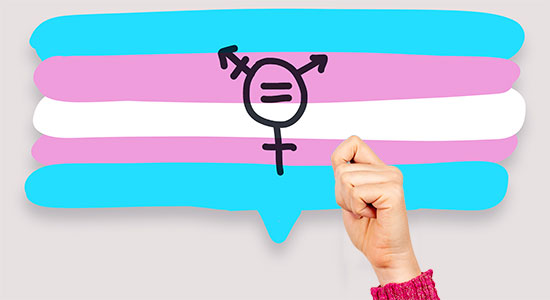
Feb. 19, 2020 – Wisconsin is home to approximately 58,000 transgender and non-binary individuals.1 While Title VII of the Civil Rights Act of 1964 does not expressly prohibit discrimination on the basis of sexual orientation or gender identity, in 1982 Wisconsin led the nation as the first state to prohibit discrimination based on sexual orientation.2 In recent years, legal issues in this area are more visible than ever.
This article provides a brief summary of common legal issues and resources available to effectively assist transgender adults and children in Wisconsin.
Concepts and Terms
It is important to have a working knowledge of the concepts and terms commonly used when discussing transgender or non-binary individuals.
Transgender is an expansive term that is used to describe people whose gender identity is different from the gender they were assigned at birth.
Gender identity is a person’s internal knowledge or sense of being male, female, a combination of the two, or neither. Gender expression is how a person presents their gender to others via clothing, hairstyle, voice or body features.
Non-binary or genderqueer are terms used by people who don’t identify as male or female or who identify as a combination of female and male.
Gender transitioning occurs when a person begins to live in accordance with their gender identity rather than the gender they were assigned to at birth.
Gender transitioning can include changes to clothing, name, appearance, or pronoun usage and the replacing identification documents like driver’s licenses or passports.
Transitioning can also include the use of medical interventions like hormone therapies or surgeries. It is important to note that not all transgender individuals follow the same transition route and that many are unable to take any or all of the legal or medical steps they desire to transition.
Thus, it is extremely important for an attorney to establish a trustworthy relationship with their client so that any and all protected categories the client may fall under are examined. Many transgender individuals choose to change their name and gender marker on identifying documents like driver’s licenses or birth certificates.
Name Changes and Gender Markers
Changing a name in Wisconsin requires filing a Petition for Name Change Form, a Notice and Order for Name Change Hearing Form, and an Order for Name Change Form. The individual must also publish the Notice and Order for Name Change Hearing in a local newspaper where they reside for three weeks and attend a name change hearing. Individuals under the age of 14 must have a parent or legal guardian lead the petition for the name change.3
The steps for changing the gender marker on a Wisconsin driver’s license are not clearly established by the Wisconsin Department of Motor Vehicles (DMV).
The DMV requires a court order or a “physician’s report” in addition to all other documentation needed to replace a driver’s license.
A physician’s report must contain information explicitly describing the individual requesting the change, it must state the physician-patient relationship, and it must state that the individual has received “clinically appropriate treatment.”4
Changing a name on a Wisconsin birth certificate entails submitting a certified copy of the name-change court order to the Wisconsin Vital Records office.
Changing the gender marker on a Wisconsin birth certificate is much more prohibitive for transgender people because it requires proof of a “surgical sex-change procedure,” which may be unaffordable or unwanted medical intervention.5
Unlike changing a name in Wisconsin there is no explicit procedure published regarding changing the gender marker on a birth certificate and a petitioner should check the proper steps with their respective clerk of court.
Sports Participation
Transgender and non-binary children attending public K-12 schools may encounter issues with participation in sports. The Wisconsin Interscholastic Athletic Association (WIAA) has developed a policy for the participation of transgender students in school sports to ensure fair play for all students.
The WIAA’s criteria for transgender student participation are: a statement from the student affirming their gender identity, documentation from the student’s parents or friends affirming the student’s gender identity, written verification from a medical professional indicating the student’s gender identification.
The WIAA also has established mandatory rules and criteria to be followed for any transgender student receiving hormonal therapy.6
Other Resources
As the definition and understanding of sex, gender, and gender identity continue to evolve we will undoubtedly see continued efforts to change our laws as they are applied to transgender individuals. At the time this article was written, there are three cases pending before the U.S. Supreme Court that grapple with Title VII and whether it permits discrimination based upon gender identity or sexual orientation.
The cases are Altitude Express v. Zarda, Bostock v. Clayton County, Georgia, and R.G. & G.R. Harris Funeral Homes Inc. v. Equal Employment Opportunity Commission et al.
To find additional information about transgender law and issues you can visit the Transgender Law Center or the American Bar Association’s Commission on Sexual Orientation and Gender Identity.
In addition, Sexual Orientation, Gender Identity, & the Law – published by State Bar of Wisconsin PINNACLE® – is an invaluable resource.
Endnotes
1 Cara Lombardo, Wisconsin Considers Transgender Anti-Discrimination Bill, LGBTQ Nation (June 3, 2017).
2 Wis. Stat. § 111.36(1)(d)1.
3 Basic Steps to Handling a Name Change, Wisconsin Court System (last accessed Jan. 26, 2020).
4 Christopher S. Krimmer et al., Sexual Orientation, Gender Identity, & the Law, 4-16 (2018).
5 Wis. Stat. § 69.15(4)(b).
6 “Transgender Participation Policy,” (last visited Jan. 24, 2020).
